- Home
- Laura Purcell
Bone China Page 15
Bone China Read online
Page 15
Removing his coat, he folded it and laid it upon a level slab. That would serve as a pillow, if the straw ones were too flat for him. The air was rather chill, but there were plenty of blankets, and he was by no means averse to cooling the general temperature of these men.
On the other side of the cave, Louise bent over the youngest man – Henry, was it? Maybe Harry. The lantern light reflected in her spectacles and turned her eyes into discs of gold. He felt a flush of pride seeing how tall she was, how robust against the slender man. Not quite the beauty Kitty had been, perhaps, but with a charm of her own. Fully grown. His heart seemed to stumble in his chest as he reflected that Louise’s mother was about the same age when she gave birth to her.
Louise handed her patient a gallipot. ‘Here. It is camphor. Apply a little to your chest and your back before you try to sleep. It will help.’ She mimicked Ernest’s own authoritative tone, he noticed. He could not help but smile.
Leaving Harry to follow her directions, she withdrew. Despite the encroaching dark, she managed to pick her way over the slimy stones towards Ernest.
‘You were born to the wrong sex, my dear,’ he told her. ‘If you had been able to serve as my apprentice, I would be losing my patients to you by now.’
He had meant it kindly, but he heard the bitterness that crept into his voice. Such talk was meaningless – he had no patients left to lose.
‘Everything I know, you taught me, Papa.’
He considered her, as she stood half concealed by shadows. During the terrible nights of illness, they had whispered together many times in such poor light. In the dark, she seemed hardly his child at all but an indispensable part of himself, following his directions, supplying his missing thoughts. ‘And so it will not surprise you to hear these patients are worse than I expected. You will require all of your learning to help them, and I …’ he trailed off. There were not enough words to convey the activity his mind was buzzing with. ‘I will work harder. I shall find the cure.’
His daughter carried a habitually worried expression behind her spectacles, but he saw it deepen, carving two lines between her eyebrows. ‘The man I was speaking to. Harry. He seems stronger than the rest. And the Chinaman’s appearance is very slender, but I note that he is still alert.’
‘Yes. That is true.’ He stroked his chin. Stubble had grown there without his realising.
There was undoubtedly a difference in the patients. Poor Tim clearly had the galloping consumption that had taken Kitty and Francis so quickly. But the men Louise had singled out seemed to echo the gradual decline of Mopsy. Almost a different, more refined version of the illness. Did this mean, then, that there were two strains of the same disease? Not just one but two impossible cures to find?
He placed his face in his hands and rubbed it hard, as if it would restore will to the flesh.
‘It is late. Off to bed with you, my dear.’
Louise pursed her lips. ‘Are you sure I should not stay, Papa? You will need some help …’
‘No, no.’ In truth, he would like to keep her with him, but he would not have his precious girl sleeping on rocks, surrounded by knaves. ‘I know I have a tendency to set propriety at naught, but I must draw the line somewhere, Louise. Your mother … she would never forgive me.’
She gave a tight nod. ‘I will fetch you in the morning.’
‘Of course. I will come up to the house and we shall take breakfast together.’
‘You do not require my assistance lighting any fires?’
‘Not tonight. I believe it is mild enough, and the men need cooling down.’ He peered over her shoulder. The sun was nothing more than an ember gasping above the waves. ‘I had hoped your maid might come down to accompany you back to the house.’
The corner of her mouth quirked, as if she had some secret amusement. She leant in and kissed his cheek. ‘I shall do perfectly well alone, Papa.’
Removing a lantern from its hook, she began to walk with it swinging gently at her side. For a moment her shape appeared, clear as cut glass in the mouth of the cave, and then she was gone.
It felt as if she had taken all the light with her.
After a final check on the men, he lay down and attempted to get some rest. Perhaps the moon was full tonight, and maybe there was a frosting of stars, but inside the cave he could see none of it. Everything was black as a mole’s pelt. He stared upwards for a while, equally disconcerted and fascinated. You would not find a darkness so absolute in Bristol. It seemed to press on him like a living thing.
Ernest closed his eyes and scarcely noticed any change.
One of the men muttered.
He was tired, but he had learnt this meant nothing to his busy mind. It was occupied in recalling medical lectures from years ago. Briefly, it alighted upon his other patient. He had scarcely seen her. Tomorrow he must make the time … She had not come down to the cave. Was that due to an excess of domestic work, or did she have another reason? Not all girls were like Louise; some shrank from illness. And hadn’t he read something … yes, something in that folklore book. Fairy Caves. Pixie’s Parlours.
He shifted on his slab. Under the cover of night such stories did not appear fantastical.
The stone amplified every sound. A distant drip. The sea, gurgling against the sand. When the wind blew it made a high, keening note like a chained dog.
For all his isolation, he did not feel quite alone. There was that indefinable sensation … a lingering. As if someone were watching him through a window.
He opened his eyes. Black, still black. Louise was right, he should have lit a fire and ordered another pallet for his own use. The temperature was dropping.
He passed a hand across his eyes, as if it would help matters. Somebody was there, he was sure. One of the men. They might have stumbled from their hut in search of aid. But where were their footsteps? All he could hear was that drip.
‘Ernest.’ Right against his ear, the breath hot on his skin.
He cried out and jerked into a sitting position. Who was that?
Who was she?
His heart thundered. He reached out with both hands, grasping, trying to feel. Stone. Cold, hard stone. There was nothing, no one beside him.
He could hear himself panting. The short, shallow gasps of fear. It was impossible to slow his breath while it remained so dark – there was nothing to anchor him.
Pull yourself together, man.
A dream. He must have fallen asleep and imagined … He had overtaxed himself. All that worry was manifesting itself in strange fancies. But he was awake now. He was certainly awake, and cold.
How he wished for Louise.
The thought of her steadied him. He remembered her childhood nightmares – worse than Kitty’s had ever been, as if the poor girl had some prescience of the horrors she was going to witness. He had calmed her so many times. How had he done it? What did he say? Take a deep breath, count to ten …
‘One,’ he whispered, ‘two …’
A strangled scream.
He sprang to his feet.
‘Hello, there!’ he cried out into the emptiness.
His words echoed with nowhere to land.
He must walk, must make his way to one of the huts, but it was hard to force his legs to obey. They did not want to step forward into a wall of blackness. It went against all good sense.
Stop being such a fool.
Haltingly, he managed to take a few paces on the uneven rock.
‘Help me!’ A male voice this time, not the one that had whispered in his ear. He took courage, headed towards the sound.
Shapes appeared in the darkness. A smudge of yellow that must be a lantern – he knew he had left some of them burning. He had never meant for the cave to grow this gloomy at night. The wind must have snuffed the other flames out.
With a wash of relief, he saw the door to a hut and a puddle of light spilling across the threshold. He was grounded again. A physician. He felt ashamed of his folly, but the devil take him
if that hadn’t been the most vivid dream …
The hut belonged to Chao. Louise dubbed him a Chinaman, but the voice that called out was as English as roast beef.
‘Doctor! Get ’em off me! Get ’em off!’
Ernest took the lantern from its hook on the wall of the hut and bent down beside the man.
Chao’s face was beaded with sweat. His eyes had the appearance of smeared glass.
‘Calm yourself, man. You are feverish, nothing more.’
Chao stared about him with his mouth ajar. ‘But they … where did they go?’
Patiently, Ernest swept the length of his frail body with the light. ‘See here, there is nothing on you.’
‘But I felt …’
‘You have thrown your blanket off in your sleep,’ Ernest pointed out. ‘The cool air must have tickled your skin and caused you to dream.’ He picked the tangled blanket up and handed it to Chao, who snatched it under his chin like a child. Fear and emaciation left him looking utterly harrowed.
Suspicion and wild visions were all part of the illness, of course. He debated giving Chao some laudanum to help him sleep, but that might lay his troubled mind open to stranger phantasms still.
‘Let me find the barley water. Miss Pinecroft left some by each door. A drink will restore you to yourself. Are you in any pain?’
Wordlessly, Chao shook his head.
When Ernest handed him the tankard, Chao sipped at it meekly enough, but still his dark eyes darted around the confines of the hut. It was on the tip of Ernest’s tongue to ask him what he thought he had seen, but he judged it better to let the vision pass from his mind.
How could other physicians be content to let people suffer like this? Phthisis was a trial not just on the body but on the mind and the spirit. It was monstrous. He must find the cure. But the sea air, which he had set so much store by, seemed already to be working against him: dousing his lamps, irritating Chao’s delicate skin and whispering …
Gingerly, he touched his ear.
Chao spluttered into his tankard. ‘Doctor?’ he croaked.
‘Yes, Chao.’
‘I’m tired.’
‘I should say so,’ he replied. ‘You look absolutely hag-ridden.’
A tremor passed over the man’s slender frame. Perhaps it was too soon for him to laugh off the experience.
‘I don’t think …’ Chao glanced down at the blanket, embarrassed. ‘Inside, you see, there’s a lot of people. Chained in the cell. All cooped up together, we are. It’s what I’m used to.’
Ernest supressed a smile. He knew what the convict’s pride would not let him admit.
‘Ah. An oversight on my part. I did not consider how difficult it would be for you to adjust to the change. It is a natural reaction of the body. It senses danger, although there is none.’
‘Right.’
‘Suppose,’ Ernest added conversationally, ‘I were to sit in here for a spell? Just until you fell asleep again. Your body might register my presence and allow you to rest easier. That is what it is used to, after all.’
He could almost see the tension leaking out of Chao’s shoulders. The blanket dropped from the bony hands that had gripped it for dear life. ‘Well, Doctor … If you think it’s a good idea …’
‘I do.’
Gratefully, the man settled down in his bed.
Ernest sat on the floor and pressed his back against the wooden wall of the hut. An improvement on the stone slab, at least. The lantern sat by his feet, bathing him in its warmth and light. He could still hear the stray drip, but it was softer here, less insistent.
He smiled wryly at his situation. In the forty-two years of his life, he never dreamt he would spend the night in a makeshift hut with a convicted criminal, but he found himself glad to do so now.
If he were honest, he was even more relieved than Chao.
Chapter 21
‘Underground?’ Creeda spoke the word as if it meant perdition. ‘He’s put those poor sick men underground?’
‘Not precisely. They are staying inside the caves for a while. Constant exposure to the sea air will prove beneficial to their diseased lungs.’
It was certainly proving beneficial to the laundry, hung out in lines before the house. White linen snapped and bellied like the sails of the ships in Bristol harbour. It would dry in no time, and that was just as well; Louise had thought little Francis made much washing, but his clouts were nothing compared to the demands of five sick men.
Having sweated over the tubs for hours, Louise and Creeda were treating themselves to a stroll upon the cliff. Mounds of thrift grew unchecked here while moss campion hugged the soil.
Pompey scampered ahead, yapping for joy. Gulls scattered at his approach.
‘Excuse me, miss.’ Creeda’s hand twitched, picking at the wicker basket hung over the crook of her arm. ‘Did you say caves?’
‘Yes, Creeda. There are caves on the beach beneath the house. That was the main inducement for my father to purchase the property. He has had this colony in deliberation for some time.’
‘I didn’t know.’
‘Did you not? I was certain my father would tell you there were diseased men, possibly infectious men, in the vicinity of your workplace. It is not like him to omit such information.’
‘Oh. Well, aye,’ Creeda replied. Louise could only see her brown eye, peering down at the empty basket. With her hooked nose, she looked rather like a bird from this angle. ‘I knew about them. Just … not the caves.’
The wind boomed, trading cannon shot with the sea.
‘Is it …’ Creeda went on hesitantly. It seemed Louise’s earlier scold had been heeded, for the maid was certainly speaking with more care. ‘Forgive me, but is it a good idea, miss?’
‘It is an excellent notion,’ she responded in a voice that brooked no argument. ‘My father is a brilliant physician.’
‘Yes, miss.’
They could not afford to lose against death a second time. Papa’s professional reputation had already suffered two mortal blows – the loss of his family and Lord Redfern’s patronage – it would not weather a third.
The caves had to work. They would work.
She looked sideways at Creeda and felt a twinge of sympathy for her. The girl was young – about Kitty’s age – alone and far from home. She had enough to be afraid of, without worrying about the men. Perhaps Louise could help allay her fears.
‘Tell me, Creeda,’ she said softly, ‘what bothers you about the caves?’
‘It’s …’ Creeda wet her lips. ‘It’s the things that live in them, miss.’
Louise remembered standing by the mouth of the cavern, that sensation of being watched. ‘Crabs? Nesting seabirds? I do not think there is anything else that might live—’
Pompey began to bark. For an awful moment, it sounded like an echo of Chao’s abrasive cough.
Both girls looked up to see the dog’s tail wagging furiously. He snorted and pawed at the ground before him.
‘What has he found?’ Louise groaned. ‘I must not let him eat it, he will be sick.’
Quickening their steps, they came up behind Pompey.
Louise seized his collar. ‘No! Leave it!’
As she pulled him away, she saw what he had been nosing.
It was a collection of bones, bleached by the sun and picked almost clean. Whatever had expired had been dead for some time. There were no flies or maggots. Grass grew up around it in a little circle, as if to lend the deceased some modesty.
After her father’s tales of the dissecting room, Louise was past being frightened by macabre sights. But she was surprised to see Creeda kneel fearlessly beside the skeleton and begin to inspect it with no sign of distaste.
‘A hare, most likely.’ Creeda picked up a bone and turned it over. Bristles of tan-coloured fur snagged on the end. ‘Or some sort of rabbit.’
To Louise’s astonishment, she placed the bone inside her basket.
‘What are you—’
&n
bsp; ‘For the factory,’ Creeda explained, reaching for a rib. ‘It’s our special composition. Six parts bone ash, four parts Growan stone, four parts clay.’
Pompey strained beneath her grasp. Louise scooped him into her arms and continued to watch her maid as she gathered up the bones. The skeleton was mainly intact. Birds had carried away the majority of the flesh, but a dark ribbon here and there gave a hint of putrefaction.
‘You mean to send those bones to your family in Plymouth?’ she asked, astounded.
‘Yes, miss, after I’ve boiled them and cleaned them up. Gerren found me a seagull yesterday; I’ll do that too. You’d be surprised what you can boil down. A whole carcass, if needs be. Makes the china strong.’
Ladies in Bristol had looked askance at Louise for her medical learning; even asked her, over tea, how she could withstand such ghastly subjects. Now she longed to go back and tell them that the very bowls they held in their hands were made of animal skeletons; that their prized sideboards were filled with nothing but bone!
‘I had no idea they could be used in such a fashion. But surely the slaughterhouses in Plymouth can provide bones for the porcelain factory?’
Creeda paused, holding the remains of the skull aloft. She caressed it with a fingertip. ‘You’d be surprised, miss. There’s demand for good bones. Ask Dr Pinecroft.’
‘Whatever do you mean?’
‘Those resurrection men. They don’t just sell corpses, miss. Sometimes the flesh is too rotten, so they flog what they can.’ Creeda sighed, packing up the remaining bones like some morbid picnic. ‘Father made a pot once, after they come round. I don’t know what he bought, but they weren’t animal bones. Not them.’
Louise felt sick. She had an image of her family’s graves in Bristol, so exposed and unprotected. Dissecting corpses to further medical science was one thing, but this …
‘Could anyone truly be so wicked?’ she whispered.
Creeda shrugged. ‘It’s a memorial, of sorts. China’s prettier than a skeleton.’ She glanced towards the coastline. The wind blew out her dark hair. ‘They mine the china clay near here, don’t they, miss? Who knows? Perhaps I’ll make some china of my own, one day.’

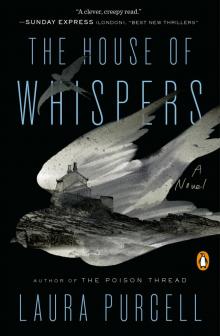 The House of Whispers
The House of Whispers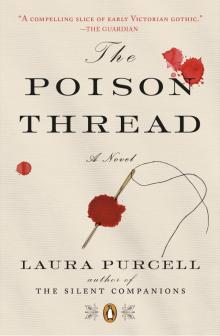 The Poison Thread
The Poison Thread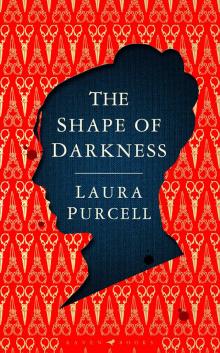 The Shape of Darkness
The Shape of Darkness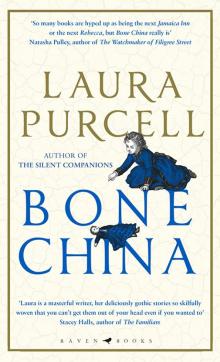 Bone China
Bone China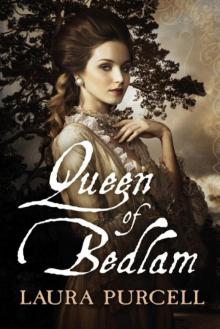 Queen of Bedlam
Queen of Bedlam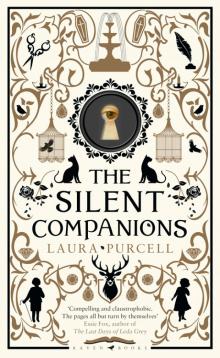 The Silent Companions
The Silent Companions